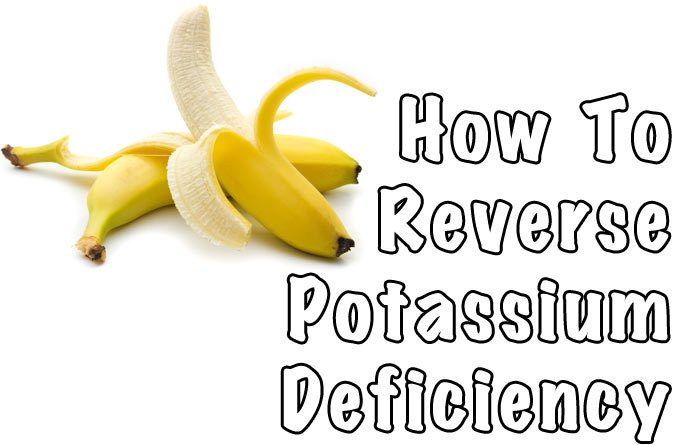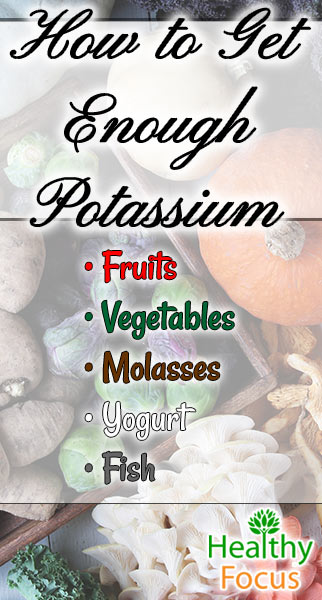Last Updated on November 21, 2016 by Marc Seward
Every cell in your body needs potassium to function. When your body experiences low potassium levels, the condition is called hypokalemia. When hypokalemia occurs, one experiences weakness as every cell in your body is effected—muscles cease to function properly and your blood pressure loses control.
Potassium is a valuable mineral that falls under the electrolyte category. As the name alludes, electrolytes contain an electric charge that help manage the electrical status quo within the body.
Popular sports drinks advertise replenishing electrolytes in your body—this is because electrolytes help boost muscular function and hydration. Without potassium, your body can experience a serious breakdown.
Potassium is essential to breaking down and using proteins and carbohydrates. Without potassium, your body wouldn’t be able to build and protect your muscles.
Causes of Potassium Deficiency
There are many factors and reasons why one may experience a potassium deficiency. People that eat a sensible and healthy diet often get enough potassium in their diet, however, there may be some issues blocking the proper absorption of potassium.
For instance, people not getting enough magnesium are unable to properly absorb potassium. Magnesium is important to an important factor in cellular health, and when you are magnesium deficient, the part of the cell that absorbs potassium does not function.
If this is the case, no amount of potassium will help you—your body can’t use potassium without the proper levels of magnesium. So make sure your mineral intake is balanced and up to snuff. There are other reasons why your body is not able to absorb potassium, and they may be some of the following:
Diarrhea and Vomiting
Your body experiences a temporary loss of potassium when it vomits or has diarrhea. Once your illness has subsided, your body is able to restore its stock of potassium.
However, if you are experiencing chronic or prolonged illness, your body may have trouble maintaining its potassium reserves. Making sure you are consuming potassium-rich foods can help curb this problem.
Kidney Disorders
The efficacy and health of your kidneys are essential because they help balance the electrolyte content in your body, which therefore helps maintain the balance of your potassium levels. Kidney disorders or issues surrounding the functioning of your kidneys can result in low levels of potassium.
Laxatives
The prolonged and consistent use of laxatives can effect the levels of electrolytes in your body and result in low potassium levels. When your body consistently loses fluids, your potassium levels can be put in danger.
• Diuretics: Diuretics encourage the consistent removal of excess fluids from your body. This may benefit your waistline, but it puts your electrolyte and potassium levels in jeopardy.
Sweating
Excessive sweating can wreak havoc on the electrolyte balance in your body. Persistent sweating without replacing the fluids in your body can result in electrolyte loss and serious consequences for your potassium levels.
Symptoms of Potassium Deficiency
It may be difficult to determine the diagnosis of a potassium deficiency because the symptoms are fairly low key and are often confused for something else. Potassium deficiency may include symptoms that affect the muscles, nerves, kidneys, heart, and the gastrointestinal tract.
Be forewarned, overlooking a potassium deficiency can have severe consequences on your health and lead to life-threatening results. If you are suffering from a potassium deficiency, you may be experiencing some of the following symptoms:
Muscle Cramps or Weakness
Potassium is important to your muscles on a cellular level in that they are required for your muscles to have the ability to contract and move.
When your potassium levels are low, your muscles have trouble with these functions and become easily fatigued. Other muscular symptoms you may experience during times of potassium deficiency are twitching, spasms, and prolonged states of contraction.
Achy Muscles and Tenderness
As you are probably beginning to realize, potassium is extremely important to the health of your muscles. Not getting enough potassium not only affects the cellular health of your muscles, but experiencing a potassium deficiency can actually damage your muscles as well.
When this type of damage happens, its called rhabdomyolysis, which is the result of muscle cells breaking down and their contents oozing out. Symptoms of rhabdomyolysis include muscle tenderness, fatigue, stiffness, and aches.
Abdominal cramps
When your potassium levels are low, the muscles in your intestines and stomach may involuntarily contract. This may cause abdominal cramping, bloating, and pain.
In some cases, constipation may even occur. In extreme cases, your intestinal activity may come to a halt, resulting in the condition paralytic ileus.
Persistent Thirst and Frequent Urination
A drop in electrolytes will occur when large amounts of water are filtered out through the kidneys. This will result in frequent urination and persistent thirst.
Tingling and Numbness
Falling potassium levels may cause your nerves to misfire. This abnormal activity in your nerves can lead to a numbness, or burning and tingling in the hands and feet.
Irregular heartbeat
A body suffering from low levels of potassium may experience heart palpitations. Your heart is controlled by the electrical charges controlling your cardiovascular muscles.
When hypokalemia comes into play, this electrical and muscular system is affected. This may cause your heart to skip a beat or experience too many beats, resulting in abnormalities in heart rhythm. Abnormalities in heart rhythm can have serious consequences such as cardiac arrest.
Fainting
Low potassium levels can lead to low blood pressure. When one experiences low blood pressure, they may become dizzy or even faint. These symptoms may especially be prevalent when you try to stand up.
Paralysis
Severe cases of hypokalemia may result in the loss of muscle functioning altogether. Your muscles may fall limp and just stop working. This is particularly dangerous when it affects the cardiovascular muscles, which may cause slow, shallow breathing or a cessation of breathing altogether.
Getting Enough Potassium
Avoiding a potassium deficiency can be easily maintained via your diet. All of the foods listed below are rich in potassium and can help avoid the unpleasant and potentially dangerous symptoms of falling electrolyte and potassium levels.
Fruits
Bananas, oranges, apricots, avocados, tomatoes, peaches, cantaloupes, mangoes, kiwis, and dates are excellent sources of potassium. Some experts believe that eating a banana may immediately treat muscle cramps.
Vegetables
Lots of veggies contain high levels of potassium, such as sweet potatoes, beet greens, kidney beans, lima beans, soy beans, winter squash, lentils, split peas, red peppers, and carrots.
Molasses
Replace honey and sugar with molasses to get your daily dose of potassium. One tablespoon of this sweet delight will grant you almost 500 mgs of potassium. Molasses also contains good amounts of calcium and iron to help keep your minerals leveled out.
Milk: Did you know that milk is an excellent source of potassium? One cup of skim milk contains a whopping 382 mgs. Adding milk to your smoothies can add an extra boost of potassium.
Yogurt
Eight ounces of plain, organic, low-fat yogurt will give you a major potassium boost. Add some granola or an extra healthy boost.
Fish
Those who prefer a marine-themed adventure when it comes to their diet will find lots of fish rich in potassium. A can of sardines alone contains 365 mgs of potassium in just one can. Salmon, halibut, tuna, and cod are other examples of potassium-rich fish. Three ounces of clams have a high concentration of potassium as well.



Leave a Reply
You must be logged in to post a comment.